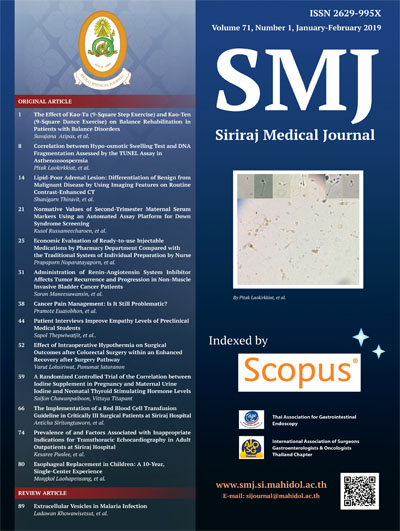Extracellular Vesicles in Malaria Infection
DOI:
https://doi.org/10.33192/Smj.2019.14Keywords:
Extracellular vesicles; exosomes; Malaria; Plasmodium spp.Abstract
Malaria is one of the tropical diseases which cause high rate of morbidity and mortality. The disease is caused
by the infection of protozoan parasites in the genus Plasmodium. The severe syndromes of malaria infection arise
from the complex sequences of parasite-host interactions. It starts with parasite invasion and followed by the rupture
of infected red blood cells causing the release of parasite products that activate the host immune response. During
the past decade, research on the functions of extracellular vesicles (EVs) in many diseases including malaria has
increased dramatically. This article reviews the role of EVs in malaria immunopathogenesis. Investigations into
modulators in immune response, ubiquitous mechanism for intercellular communication between parasite-parasite
and parasite-host, as well as its usefulness as the diagnostic biomarkers are highlighted.
Downloads
Published
How to Cite
Issue
Section
License
Authors who publish with this journal agree to the following conditions:
Copyright Transfer
In submitting a manuscript, the authors acknowledge that the work will become the copyrighted property of Siriraj Medical Journal upon publication.
License
Articles are licensed under a Creative Commons Attribution-NonCommercial-NoDerivatives 4.0 International License (CC BY-NC-ND 4.0). This license allows for the sharing of the work for non-commercial purposes with proper attribution to the authors and the journal. However, it does not permit modifications or the creation of derivative works.
Sharing and Access
Authors are encouraged to share their article on their personal or institutional websites and through other non-commercial platforms. Doing so can increase readership and citations.















